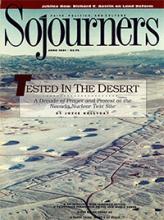The focus this past Easter morning [in 1991] at Sojourners Community worship was the power of God, and the power of what the Bible calls the world system, which is governed by sin and death. The question before us this Resurrection Day was, Which power do we really believe is ultimate?
The response of the first disciples at the tomb, upon hearing the good news of the resurrection, was that it scared them to death. It filled them with "terror and amazement."
In his book Resurrection, Morton Kelsey says:
Suddenly they were confronted with a world in which God was more powerful than the Temple, or Rome, or any other power ... Of course part of them rejoiced in the hope that Jesus had risen, but still more of them were stupefied, paralyzed with fear. The world was the way Jesus had described it. They had never quite believed him ... If it were true, and that bright immensity that encountered them could not be denied, then they had built their lives on all the wrong assumptions.
Finally, says Kelsey, "If the Resurrection is true, then this world is not what it seems to be, and I may be called to follow the way of love revealed in this event." Now that is enough to scare anyone.
These disciples had followed Jesus, they loved him, they thought they had given their lives over to him. But when it appeared that what he was saying might really be true, that the world was not as it appeared to be but was as he said it was, they got scared.
If we really experience the resurrection, it will scare us to death too, and perhaps even scare us to life. We will know the disciples' joy and terror. Because to be honest, most of us aren't really sure about Jesus. We believe him, we admire him, but we really aren't absolutely convinced he was right. At least we haven't totally bet our lives on it. We are still hedging our bets.
Read the Full Article
